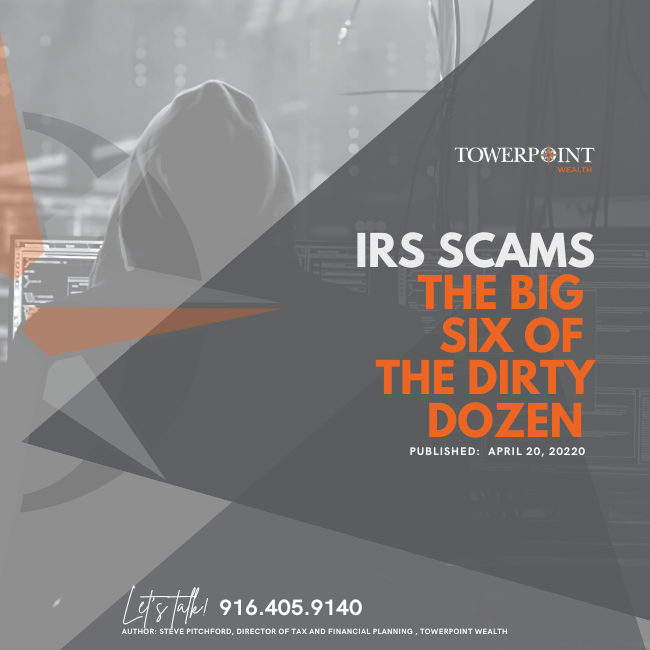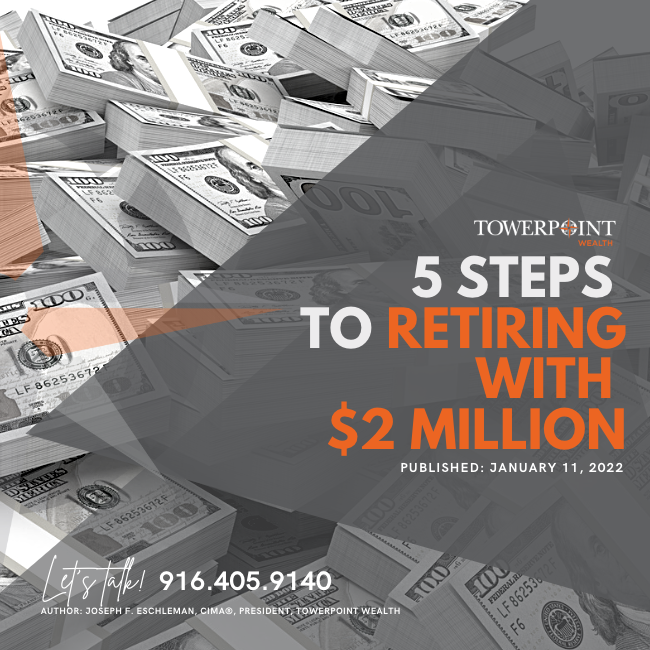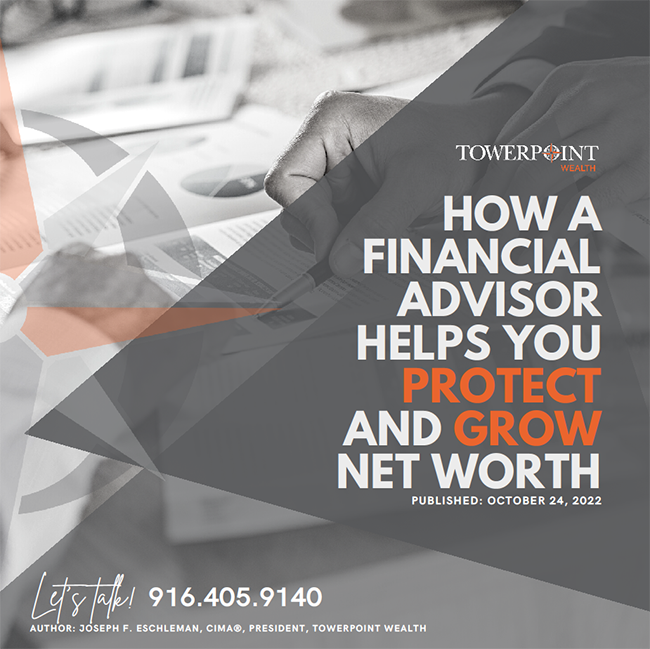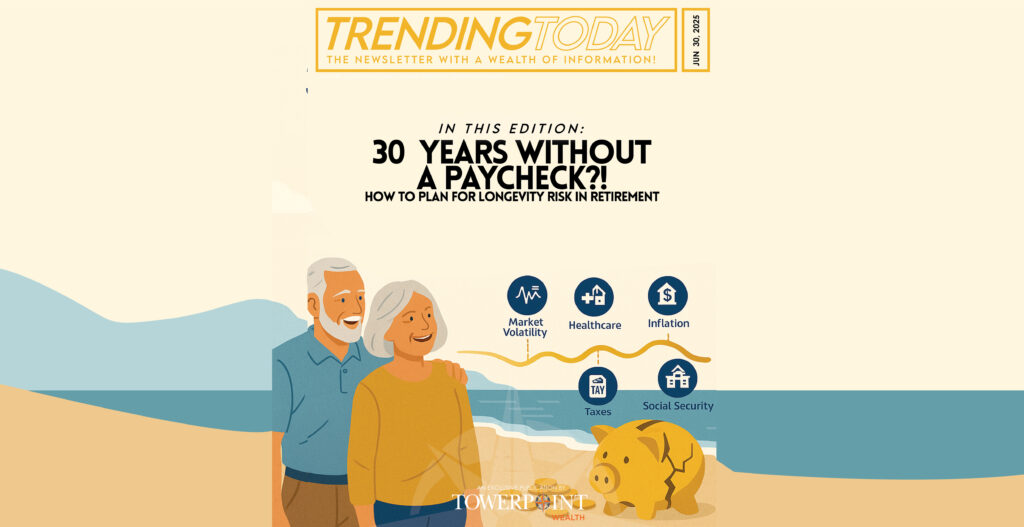
Each year, the Internal Revenue Service (IRS) releases an annual report known as the “Dirty Dozen.” The report highlights the most commonly practiced tax scams that the IRS identifies each year. Which of these current and past scams should you be most worried about? We have identified six worth keeping a special eye on.
1) Phishing
Phishing is the process of an individual or organization illegally trying to collect your sensitive information (personal, financial, etc.).
According to the IRS website, common phishing schemes center around fraudsters impersonating the IRS via email, regular mail, telephone, text messages, or even social media.
As a matter of policy, the IRS does not contact taxpayers by email, text message, or social media.
What should you be on the lookout for to identify phishing? Fraudsters…
- Claiming that they are with the IRS and are missing some of your financial or personal information to process your tax returns
- Stating that suspicious activity has been detected on your online IRS account
- Asking you to click a link to finalize a tax payment
- Offering a tax refund
2) Identity Theft
Tax season is a dream time of year for fraudsters.
Once a taxpayer has become the victim of phishing, a common next step for the fraudster is to file a tax return in their victim’s name early in the filing season to receive a sizable tax refund. The biggest challenge with tax refund identity theft is that the taxpayer likely won’t even realize the occurrence until they try to file their return. At which point, the IRS will “flag” the return and mail the taxpayer a 5071C letter to verify their identity.
The first step to prevent identity theft is to diligently protect your personal and financial information. Be wary of the phishing tactics described above, and also be cautious when providing businesses and individuals with your social security number. In addition, you should file for “my Social Security” online, install antivirus and firewalls on your computer, change passwords on online accounts frequently, review your credit report for suspicious activity, and most importantly, use common sense.
If you are concerned that you were subject to identify theft, immediately inform your CPA/tax professional, your financial advisor, your bank, the Social Security Administration, and the IRS.
3) Fake Charities
Fraudsters know that using a fake charity to solicit contributions from unwitting victims has a history of past success.
Be cautious if you notice that a charity’s name is similar to, but not the same as, well-known charitable organizations.
Vetting a charity before you contribute to it is always a smart idea. One way to do so is by visiting Charity Navigator and searching for a charity to ensure that it’s legitimate.
4) Inflated Refund Claims
While most CPA/tax professional firms are reputable and trustworthy operations, there are those out there established for the sole purpose of stealing your money by offering inflated refunds.
If you find a firm advertising, and often guaranteeing, a sizable refund, don’t just be skeptical, run the other direction! The refund is often simply incentivizing you to provide the fraudster with your personal and financial information, so they can then use this information to file for this refund on their own.
A firm offering to be compensated by a percentage of the refund is just another variant of this strategy.
5) Falsified Income for Credit Claims and Padded Expenses
The IRS regularly analyzes tax returns to check for income that is inflated (to allow for a refundable tax credit claim) and to ensure that expenses are not exaggerated.
Always be sure to review your tax return prior to submission for inflated income, falsified deductions, and padded expenses.
If you believe you were a victim of a falsified income for credit claim or padded expenses fraud, you should immediately file Form 3946-A with the IRS.
6) Tax Return Preparer Fraud
Tax return preparer fraud is the overarching theme of this white paper and encompasses all sections above.
It’s important to remember that you are the one who is ultimately responsible for your tax return.
And while you may have a CPA/tax professional preparing your return, it pays to have at least baseline knowledge of taxes to be able to identify when a tax preparer is not working in your best interest.
It’s also prudent to review your tax returns before you sign. If reviewing your taxes is confusing or overwhelming, you can often find low-cost help. Check your local resources for libraries and community centers to see if they have tax preparation volunteers.
How Can We Help?
Search results for “sacramento financial advisor near me” include the Towerpoint Wealth team because we’re in the middle of it all. Towerpoint Wealth is a fee-only certified financial planner near Roseville, Rocklin, Auburn, Granite Bay, Folsom, Gold River, El Dorado Hills, East Sacramento, Curtis Park, Land Park, Elk Grove, Rancho Murietta and Davis. We are conveniently located on Capitol Mall in downtown Sacramento.
Are you searching “certified financial planner near me?” You’ve found Sacramento independent financial planner Joseph Eschleman, as well as certified financial planner Steve Pitchford, CPA, CFP®, our entire independent wealth management team. Please reach out to us to learn more about how our Sacramento financial planning team can assist you.






